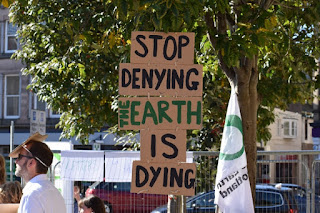Health Secretary Rt Hon
Matt Hancock MP recently articulated
his support for compulsory vaccinations. He commented that there is a 'very strong argument' for making vaccinations compulsory, and I am wholly with him on this.
Anti-vaxxers
There is a small but significant group of people - anti-vaxxers - who don't believe in vaccinations. This scepticism might take a number of forms. Anti-vaxxers might believe that:
- vaccinations don't really work;
- other methods are better at protecting from illness;
- it's dangerous to inject diseases into people;
- vaccinations carry a significant risk of disease or other condition (such as autism);
- we shouldn't interfere with nature;
- vaccinating a particular child isn't necessary, because the disease in question is uncommon - perhaps because so many other people are already vaccinated.
Some of these standpoints are based in sheer ignorance, while others are based more on hope/faith. Below I examine these claims and argue that vaccination should be compulsory for all who can be vaccinated.
Vaccines don't work

There is a massive body of evidence which shows that vaccines work, and protect against illnesses far better than other methods. Nonetheless, just as abstinence will protect one against sexually transmitted infections better than a condom can, avoiding all human contact is likely to be very effective in the fight against communicable diseases. But in most cases, it's wholly unrealistic, and not a method used by anti-vaxxers anyway.
People might suggest that other methods - such as prayer, homeopathy, voodoo magic and so on - will protect against illnesses as well as or better than vaccines can. I would love to see a clinical peer-reviewed study into this. Group A is vaccinated against measles; Group B prays; Group C uses homeopathy or something similar. Then all participants in each group are exposed to measles in the same way - say, a person with measles coughs in their face. Then, we monitor the results, and see which of the people contract measles.
Obviously, this sort of study would never pass ethical review - and why not? Because it'd be considered too dangerous for groups B and C! This is of course because we know that the non-vaccinated people would be in critical danger of developing measles, a disease which can kill.
Vaccines cause sepsis, autism etc
Although it's possible to cherry-pick anecdotal stories which show a person who was vaccinated later getting the disease, or to give credence to discredited 'scientific' studies such as the one which linked the MMR vaccine to autism, the overwhelming body of evidence shows that vaccines work, and are not dangerous.
There are some tragic cases where children die suddenly, and it is totally understandable that parents and other relatives or friends would try to find meaning in the death, and to know why it happened. Take sepsis as an example: it arrives with commonplace symptoms such as rapid shallow breathing, low temperature, and nausea, and by the time symptoms seem serious enough to seek medical help, the patient might be beyond the stage where they can be saved. It's only natural to think back to what could have caused it, and what has happened in the few days prior to the illness or death.
If a child has a vaccination, and then a few days later develops sepsis or some other horrible illness, it is understandable that a parent would make a causal link between the two, even if that link is unjustified. But any good statistician knows that correlation doesn't prove causation. Just because a child begins exhibiting symptom Y a few days after event X does not prove that X caused Y. Science doesn't work like that; superstitions do. If a child get sepsis a few days after walking under a ladder this is not compelling evidence of a link either.
So although it's understandable why people would make the link, it's unjustified.
We shouldn't interfere with nature
I have a great sympathy for this sort of attitude, and when it comes to something really invasive like a blood transfusion or an organ transplant, I am even more sympathetic to the standpoint. I can totally understand why some people might prefer to live a more simplistic and natural life, free from medical intervention and 21st century attempts to play god with medical science. It's not a belief I share, but I can understand the motivation to pursue such a life.
Often, but not always, such a standpoint might be grounded in religious beliefs such that one decides that if it is God's will that he dies from measles or heart failure, then so be it, God has decided. To try to circumvent God's plan by using medical interventions is contrary to God's plan and it therefore wrong. I respect that thinking, and when it involves things that only affect oneself, I would never argue that we should force people to have medical procedures they don't want.
HOWEVER
Whilst lifestyle and religious beliefs should be tolerated and respected, when S's religiosity starts to have a potentially fatal effect on everyone else's lives, tolerance and respect needs to come to an end.
If it were someone's religious or personal belief that one should carry razor-sharp weapons in each hand, and swing his hands vigorously as he walked, this is fine on a deserted island, but totally unacceptable in a public place - particularly around children who would be in greater danger from such activities. It would be legitimate to say he cannot enter a public place whilst swinging his knives around.
Analogously, if someone chooses to remain unvaccinated for religious or personal beliefs in the sanctity of nature, this is fine if they are alone or around others who share that belief. But when they bring their potentially disease-ridden bodies into a public place, they are playing Russian roulette with other people's lives - particularly children who are in greater danger from many communicable illnesses. It then becomes legitimate to say he cannot enter a public place whilst he is unvaccinated.
As John Stuart Mill wrote: "The only purpose for which power can be rightfully exercised over any member of a civilised community, against his will, is to prevent harm to others." (
On Liberty 1859/1974:68). I may have mentioned elsewhere that Mill is a legal genius, well ahead of his time, and although there are some problems with his theories which future scholars have had to iron out, the principle stands as a really useful one to live by. Do as you please, but when it starts to endanger others, your right to individuality ends. Mill would have supported compulsory vaccination.
Herd immunity
When a high enough proportion of people (typically 95-100% is quoted) are immune to an illness, the remaining 0-5% are safe too - after all, the disease is really uncommon and unlikely to be spread around. If I'm unvaccinated, but all the people I come into contact with are immune to an illness, then I'll never get the illness, because
they'll never get the illness.

That's the theory, at least. For some illnesses, this is absolutely true, but I think there might be some illnesses which an immune person can still carry and pass on to others (I'm not totally sure about this though - maybe I'm just remembering that scene in
28 Days Later where the immune children passed on the zombie sickness to their mother?!)
Anyway, even if no one can carry an illness they're immune to, the herd immunity argument only works when the number of people immune to the illness is very high. If only 1% of people are susceptible to measles because everyone else is vaccinated, then there's only a very slim chance of coming into contact with another unvaccinated person - and a slimmer chance still that the unvaccinated person just so happens to be contagious at that moment.
But as the number of unvaccinated people rises, the chance of catching the illness increases.
Vaccination against measles among UK children now stands at around 90% - one of the worst uptake rates of any developed country. Herd immunity to measles has been lost.
Some people can't be vaccinated, because they have an autoimmune disease or something similar. And babies aren't vaccinated against every illness the moment they leave the birth canal, but rather, they receive vaccinations in their first few months of life. This means that young babies and some older children and adults are susceptible to preventable illnesses. Why should their health be risked because S decides not to vaccinate their child and instead rely on herd immunity? The herd immunity approach should be reserved for those and only those who
cannot be vaccinated for health reasons. Everyone who is able to be vaccinated should be vaccinated.
Smallpox and Measles
 |
| Child with smallpox |
Does anyone remember smallpox? I don't. No one I know - indeed no one in the
entire world - has had smallpox during my lifetime.
In the 20th century, smallpox was responsible for
300-500 million deaths worldwide; in 1950, there were an estimated 50 million cases of smallpox each year. I'm not a mathematician, but that
seems like quite a lot. Yet in the last 40 years, there have been 0 cases of smallpox in the world, and it's all thanks to a worldwide vaccination programme. Without the vaccination programme, it would be highly likely that some members of my family and yours would have died from smallpox.
Measles hasn't been eradicated, and is still out there in the world doing its thing. It isn't just getting a bit spotty and feeling under the weather for a few days: it's horrendous, and can be fatal. In 2016, an estimated 90,000 people died of measles worldwide, and plenty of others suffered terribly with the disease, and were left deaf, blind, and with profound physical disabilities or even brain damage.
Wouldn't it be nice if measles went the way of smallpox, and we could eradicate it forever? It could be done through vaccination, if enough people were on board. It certainly seems as though a small but significant group of anti-vaxxers are trying to save measles from extinction, in much the same way that we might save whales and tigers from the brink. They are going out of their way to allow the disease to spread and remain alive, and they take to the streets to campaign, to get others to join their crew.
I would never wish illness or death on anyone, and I hope that anti-vaxxers never have to suffer the heartbreaking situation where their children die from a preventable disease simply because they refused to vaccinate them.... but some of them
will die. Moreover, some newborn babies and people with autoimmune disorders who cannot be vaccinated will also die, simply because the anti-vaxxers wouldn't believe the science. It's a tragedy. A preventable tragedy.










:format(webp)/cdn.vox-cdn.com/uploads/chorus_image/image/66460845/1208983109.jpg.0.jpg)










